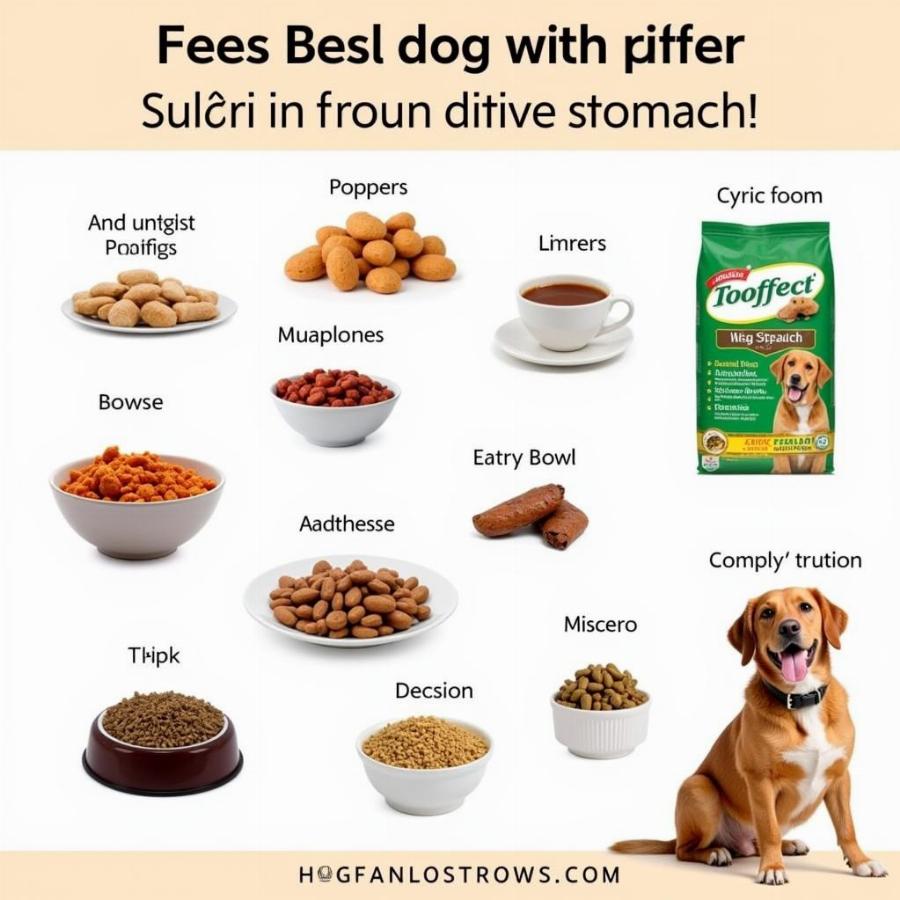Gas in dogs is a common issue, and while a little tooting is normal, excessive gas can be a sign of digestive problems. Choosing the best food for gassy dogs can make a world of difference. This article will guide you through the causes of dog gas and provide expert recommendations on selecting the right food to alleviate this smelly problem.
Understanding Why Your Dog is Gassy
Several factors can contribute to excessive gas in dogs. From gulping down food too quickly to food intolerances and underlying medical conditions, understanding the root cause is crucial to finding the right solution. Common culprits include low-quality food with hard-to-digest ingredients, food allergies, and even stress. Sometimes, simply switching to a better dog food can resolve the problem. What is the best food for gassy dogs, you ask? Let’s dive into that!
 Choosing food for dogs with stomachaches
Choosing food for dogs with stomachaches
Key Ingredients to Look for in Food for Gassy Dogs
When searching for the best food for a gassy dog, focus on easily digestible ingredients. High-quality protein sources, like chicken, fish, or lamb, are essential. Look for foods with moderate fat content and avoid fillers like corn, wheat, and soy, as these can be difficult for dogs to digest and contribute to gas.
The Power of Probiotics and Prebiotics
Probiotics and prebiotics are your allies in the fight against dog gas. Probiotics introduce beneficial bacteria into the gut, while prebiotics nourish these good bacteria. Together, they help balance the gut flora, improving digestion and reducing gas. Consider adding a probiotic supplement to your dog’s diet or looking for food that already contains them. probiotics dog food can be an excellent solution.
Choosing the Right Dog Food Type
From dry kibble to wet food, the type of food you choose can also impact your dog’s gas. Dry kibble is often more affordable and convenient, but wet food can be beneficial for dogs who struggle to drink enough water. If you’re not sure which type is right for your gassy dog, consult your veterinarian. They may recommend recommended dog food for english bulldogs if your dog is of that breed.
What about Grain-Free Options?
Grain-free dog food has become increasingly popular, but is it the best choice for gassy dogs? While some dogs benefit from a grain-free diet, it’s not a guaranteed solution for gas. Focus on the overall quality of the ingredients and digestibility rather than just eliminating grains.
How to Transition Your Dog to New Food
Switching your dog’s food abruptly can worsen digestive issues, including gas. Gradually introduce the new food over several days, mixing it with their current food. Start with a small amount of the new food and slowly increase the proportion until they’re fully transitioned.
Conclusion: Finding the Perfect Food for Your Gassy Dog
Choosing the best food for gassy dogs requires careful consideration of ingredients, digestibility, and your dog’s individual needs. By understanding the causes of gas and focusing on high-quality ingredients, you can help your furry friend enjoy a healthier, less gassy life. Remember to consult your veterinarian if the problem persists, as excessive gas can sometimes be a sign of a more serious issue. Finding the best food for gassy dogs is crucial for their comfort and overall wellbeing.
FAQ: Frequently Asked Questions about Food for Gassy Dogs
- What human foods can cause gas in dogs? Beans, dairy products, and sugary foods can all contribute to gas in dogs.
- How long does it take to see a difference after changing dog food? It can take several weeks for your dog’s digestive system to adjust to a new food.
- Can gas x help my dog? While Gas-X is generally safe for humans, can dogs use gas x? It’s best to consult your vet before giving your dog any over-the-counter medications. can dogs have gas x is a common question, and your vet can provide the best advice.
- Are there any home remedies for dog gas? Adding a small amount of plain yogurt to your dog’s food can sometimes help.
- When should I be concerned about my dog’s gas? If your dog’s gas is accompanied by other symptoms like vomiting, diarrhea, or loss of appetite, it’s important to contact your veterinarian.
Related Articles:
Beaut Dogs is your one-stop resource for all things dog-related. We provide expert advice on breeds, care, training, and more. For personalized support, contact us via Email: [email protected]. Beaut Dogs is committed to helping you provide the best possible care for your canine companion.